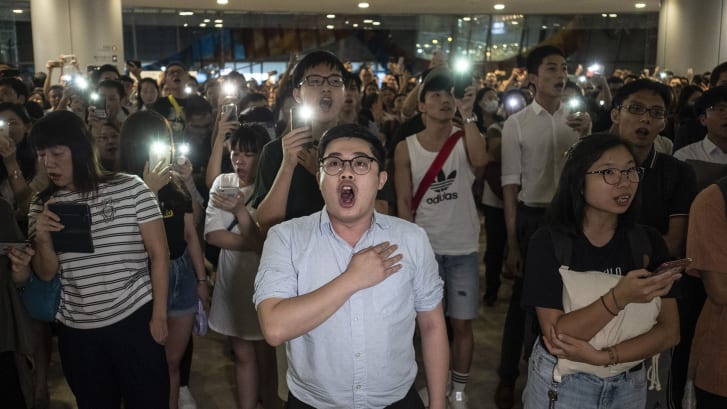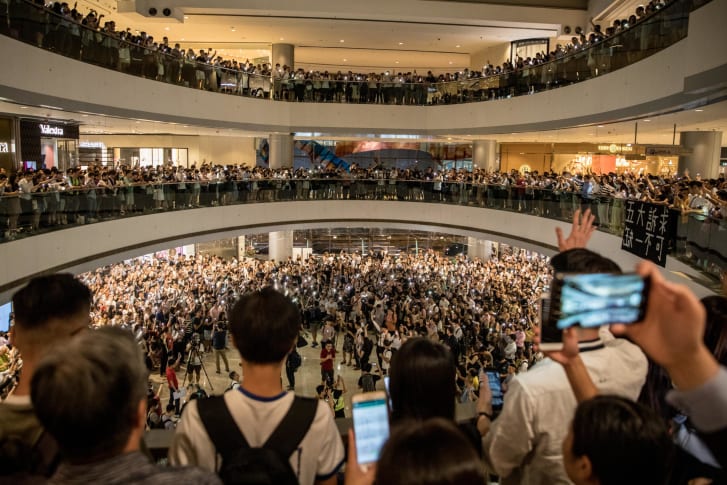Home
Unlabelled
Hong Kong protesters' new 'national anthem' is spreading like wildfire
Hong Kong protesters' new 'national anthem' is spreading like wildfire
Read
In glitzy malls across Hong Kong, people are spontaneously breaking into a song. It's not just any tune -- it's a rousing ballad that some are calling the city's new, if unofficial "national anthem."
For over three months, pro-democracy protesters in the semi-autonomous Chinese city have been demonstrating over a range of issues, including demands for universal suffrage. At times, the protests --- which were sparked by a now-suspended extradition bill -- have turned violent. But over the past week, demonstrators have adopted a new, unifying approach: singing the newly-created protest anthem, "Glory to Hong Kong."
On Wednesday and Thursday nights, large crowds in malls across the city broke into the anthem, which includes lyrics such as "For Hong Kong, may freedom reign." Earlier in the week, football fans at a World Cup qualifier match between Hong Kong and Iran booed the Chinese national anthem, entitled "March of the Volunteers," before singing the new protest tune.

Demonstrators chant slogans during a flash mob at the International Finance Center (IFC) Mall in Hong Kong on Thursday, September 12, 2019. Credit: Chan Long Hei/Bloomberg/Getty Images
"I wanted to have a melody that can unite all protesters, even those that are not normally part of the campaign," said the song's Hong Kong composer, who would only give his English name as Thomas as he was afraid of being targeted by authorities.
"I can buy (protesters) helmets as well, I can save them from physical violence, but maybe I can give them something more -- something that's spiritual. I think that the best thing to do is to come up with a new song to unite them."
Since the song was released on YouTube at the end of August, it has attracted over 1.6 million views. A video clip of the orchestral version of the song has over 1 million views, and features a choir and orchestra decked out in the unofficial protest uniform of hard hats and face masks, playing instruments as white fog -- intended to symbolize tear gas -- swirls around them.
On LIHKG, an online Reddit-like platform popular with Hong Kong's protesters, some have even called the song Hong Kong's "national anthem."
Hong Kong is not a nation -- it is part of China, but operates under separate laws under the principle of "one country, two systems."
Earlier this month, a Hong Kong and Macao Affairs Office spokesperson said that protesters wanted to make the city independent, something which is in defiance of Hong Kong's mini-constitution, the Basic Law. In an article Thursday, pro-Beijing Hong Kong newspaper Ta Kung Pao described the anthem as "the song of Hong Kong independence" which was being used to brainwash people.
The making of an anthem
Hong Kong's unofficial anthem has been in the works for months.
Thomas -- who works in the music industry and is in his mid-20s -- said he began composing the the tune in June, and published the first version of it on August 26 on LIHKG. Thousands of people offered suggestions for lyrics online, but ultimately he took only a handful of ideas.
Initially, Thomas hoped the song could be used during protest marches, and as a "glimmer of hope" for detained protesters. He's been pleased with the reception -- but not necessarily shocked.
"I thought that the melody of my song would be popular, so I'm not really that surprised by how widespread it is now," he said. "I feel happy and satisfied, this is the song that I write for them and they accept it. I feel that the main goal of that song has been achieved -- it's working well to unite people."
After months of demonstrations, many protesters complain of exhaustion -- but Thomas said some were "filled with electricity" after singing the song.

Protesters sing songs and shout slogans after gathering at the IFC Mall on September 12, 2019 in Hong Kong. Credit: Chris McGrath/Getty Images AsiaPac/Getty Images
The director of the orchestral music video -- a Hong Kong man in his early 30s who asked to be called "S" out of fear that he could be attacked or lose his job -- said around 150 local musicians volunteered to make the clip, which was filmed in a matter of hours for little cost. He wanted to show musicians using peaceful and rational means to communicate their message to the government.
"We've done what we initially wanted which is to unite these people in the darkest hours when all hope appears to be lost," he said.
A 16-year-old high school student who asked to be anonymous as he was afraid of arrest said the themes in the song resonated with him so much that he teared up.
Michelle Chan, a 24-year-old office worker, said she didn't feel pride when she listened to China's national anthem, the opening lyrics of which begin, "Arise, Ye who refuse to be slaves!" But "Glory to Hong Kong" gave her a "sense of hope" and motivated her to keep fighting.
"It might never be the official anthem, but it serves the same purpose to me: to make me proud of where I belong," said Chan, who sang the anthem in the International Finance Center (IFC) mall in central Hong Kong on Thursday. "When we sing the song together, I feel like if we stand united, we can be very powerful and there's nothing we can't do."
A survey of over 1,000 residents in June found that the proportion identifying themselves as Hong Kongers had risen to a record high since 1997, when the former British colony was handed back to mainland China. Only 27% were proud of being a Chinese national.
"I think it is a kind of identity building," he said. "But I think this whole movement throughout this summer is an exercise in identity and community building."
Political commentator and author Jason Y. Ng said the song had a "tremendous unifying impact on the movement," galvanizing both peaceful and aggressive factions.
But he agreed that it is an attempt to celebrate Hong Kong values, not an attempt to subvert Chinese sovereignty. "There's nothing pro-independence about it, there's nothing overtly subversive."
Hong Kong protesters' new 'national anthem' is spreading like wildfire
 Reviewed by Facts
on
September 14, 2019
Rating: 5
Reviewed by Facts
on
September 14, 2019
Rating: 5
 Reviewed by Facts
on
September 14, 2019
Rating: 5
Reviewed by Facts
on
September 14, 2019
Rating: 5